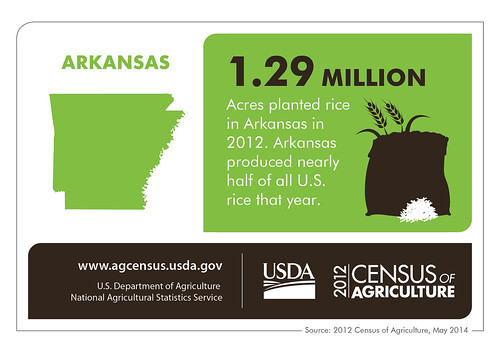
The Census of Agriculture is the most complete account of U.S. farms and ranches and the people who operate them. Every Thursday USDA’s National Agricultural Statistics Service will highlight new Census data and the power of the information to shape the future of American agriculture.
Farming has a huge presence in Arkansas, as evidenced by the results of the recent Census of Agriculture. In 2012, our state ranked 14th in the nation in value of agriculture products sold. That year Arkansas farmers sold $9.78 billion worth of crops and livestock!
Our state cuisine is the perfect indicator of our state’s farming. Rice is a staple in our kitchens, and not surprisingly, Arkansas rice growers led the nation in production of this important crop. In 2012, 1.29 million acres of Arkansas farmland were dedicated to rice production. Almost half of all U.S. rice came from our farmers that year.
Catfish is another major staple in both our cuisine and our agriculture. Census of Aquaculture results just came out last month, and in 2013 (the year Census of Aquaculture focused on), our farmers sold 27 million pounds of food size catfish with a value of $24.9 million!
Another major commodity that our farmers bring to the table is poultry. In 2012, according to the census, there were more than 170 million broiler and other meat-type chickens and 8.82 million turkeys in Arkansas, third largest inventories of both out of all 50 states in the nation. Poultry and egg sales topped $4 billion in 2012.
On top of these key elements of Arkansas food, our farmers also grow plenty of other fruits and vegetables that can be found on our tables. For example, in 2012, 2,297 acres were dedicated to snap bean production; 2,410 acres to sweet potatoes; and 1,880 acres of our farmland had watermelons growing on them.
Despite getting older on average, with each new Census of Agriculture, our farmers continue to innovate and improve their land stewardship and help Arkansas remain true to its nickname, “The Natural State.” A significant portion of the harvested cropland is irrigated (with the exception of our hay acres), which helps reduce our crops’ need for additional supplements.
As you can see, Arkansas farmers are great at taking care of our state, making sure that my fellow Arkansans can continue to enjoy the great foods that have become part of our tradition.



